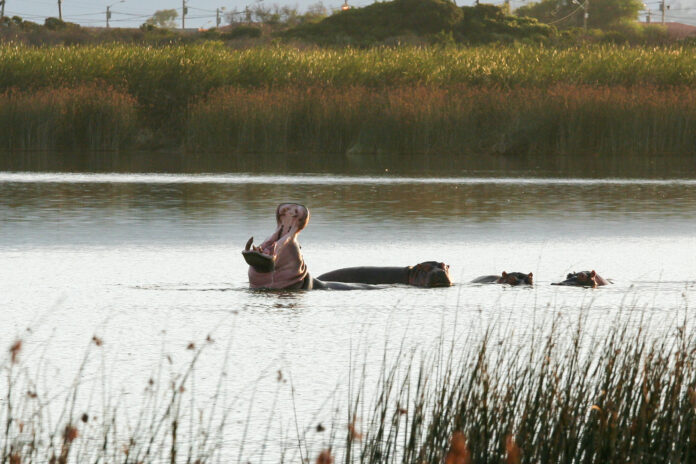
Brutus, the first hippo to be reintroduced into the Western Cape in 300 years, arrived at Rondevlei in November 1981. He passed away this week at the extraordinary age of 47 years, and was still producing offspring until recently.
Staff from the False Bay Nature Reserve were busy with routine patrols when they discovered a dead hippo bull in the Rondevlei section of the reserve on Thursday morning, 13 November 2025.
Preliminary Findings
The bull was removed from the vlei and on Friday, 14 November, the Biodiversity Management Branch’s veterinarian conducted an autopsy. It was established that the dead hippo was Brutus, Rondevlei’s famous bull. The preliminary postmortem examination found no evidence of trauma, injury, or infectious disease. The hippo was in a good condition for his age and the initial findings indicate a natural, age-related cause of death.
Tissue samples have been sent away for further analysis.
Impact on the Rondevlei Pod
‘Brutus was the long standing dominant male that arrived at Rondevlei in November 1981, and we are sad about not having him around anymore. After Brutus’s passing, the hippo pod at Rondevlei now consists of five hippos, including one young bull. We will be looking at options to potentially bring in a new male. The hippos play a vital role in maintaining biodiversity in the wetland system and are also important educational and tourism assets,’ said the City’s Deputy Mayor and Mayoral Committee Member for Spatial Planning and Environment, Alderman Eddie Andrews.
Reintroduction and Legacy Across the Western Cape
The hippos were reintroduced to Rondevlei originally with two males and then followed by two females. The animals were reintroduced by the well-known manager at the time, Howard Langley. Brutus’s offspring have been moved to many reserves in the Western Cape, with one of them being moved to the Plettenberg Bay Game Reserve earlier this year.
Environmental Role in Restoring the Wetland
The hippos were brought in to control Vleigras, an alien grass from South America, which was smothering the wetland. The hippos swiftly ate the Vleigras and opened up the reed beds. Being bulk herbivores they are capable of eating up to 100 kg per day. These days they feed on indigenous buffalo grass, Vleigras, and kukuyu.
Brutus leaves behind a legacy that reshaped Rondevlei and influenced conservation efforts across the Western Cape. As the first hippo reintroduced to the region in centuries, his presence revived the wetland ecosystem and helped establish a thriving hippo population whose descendants now inhabit reserves throughout the province. His contribution to biodiversity, tourism, and ecological restoration will be remembered long after his passing, and the pod he leaves behind continues the work he helped begin.

